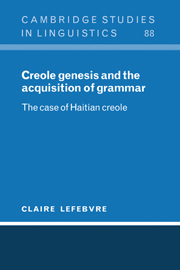Book contents
- Frontmatter
- Contents
- Tables
- Preface
- Abbreviations
- 1 The problem of creole genesis and linguistic theory
- 2 Cognitive processes involved in creole genesis
- 3 The research methodology
- 4 Functional category lexical entries involved in nominal structure
- 5 The preverbal markers encoding relative Tense, Mood and Aspect
- 6 Pronouns
- 7 Functional category lexical entries involved in the structure of the clause
- 8 The determiner and the structure of the clause
- 9 The syntactic properties of verbs
- 10 Are derivational affixes relexified?
- 11 The concatenation of words into compounds
- 12 Parameters
- 13 Evaluation of the hypothesis
- 14 Theoretical consequences
- Appendices
- Notes
- References
- Index of authors
- Index of languages and language families
- Index of subjects
9 - The syntactic properties of verbs
Published online by Cambridge University Press: 23 November 2009
- Frontmatter
- Contents
- Tables
- Preface
- Abbreviations
- 1 The problem of creole genesis and linguistic theory
- 2 Cognitive processes involved in creole genesis
- 3 The research methodology
- 4 Functional category lexical entries involved in nominal structure
- 5 The preverbal markers encoding relative Tense, Mood and Aspect
- 6 Pronouns
- 7 Functional category lexical entries involved in the structure of the clause
- 8 The determiner and the structure of the clause
- 9 The syntactic properties of verbs
- 10 Are derivational affixes relexified?
- 11 The concatenation of words into compounds
- 12 Parameters
- 13 Evaluation of the hypothesis
- 14 Theoretical consequences
- Appendices
- Notes
- References
- Index of authors
- Index of languages and language families
- Index of subjects
Summary
Although the semantic and syntactic properties of verbs are not always easy to distinguish from each other, this chapter discusses properties of verbs generally considered to be syntactic, such as selectional, raising, control and Caseassigning properties. Verbs' syntactic properties are specified in their lexical entries. The relexification hypothesis predicts that the syntactic properties of verbal lexical entries in the substratum language will be reproduced in the equivalent lexical entries in the creole. The comparison of the syntactic properties of Haitian, French and Fongbe verbs shows that, to a great extent, this prediction is borne out. The selectional properties of body-state verbs, weather verbs and reflexive verbs are discussed in sections 9.2 to 9.4. The syntactic properties of verbs that select expletive subjects, verbs that allow for argument raising and existential verbs are discussed in sections 9.5 to 9.7. Section 9.8 deals with the syntactic properties of control verbs. Sections 9.9 and 9.10 review light verbs and inherent object verbs. Section 9.11 discusses the Case-assigning properties of verbs. The properties of double-object verbs are addressed in section 9.12.
The syntactic properties of most of these verb classes in Haitian contrast with those of French and are parallel to Fongbe. There are four exceptions to this generalisation, each attesting to the other processes that play a role in creole genesis. First, the data pertaining to the selectional properties of reflexive verbs (and possibly of verbs selecting expletive subjects) show that dialect levelling has played a role in this case. Second, the properties of the Haitian existential verb appear to constitute a case of innovation from within the creole.
- Type
- Chapter
- Information
- Creole Genesis and the Acquisition of GrammarThe Case of Haitian Creole, pp. 248 - 302Publisher: Cambridge University PressPrint publication year: 1999



